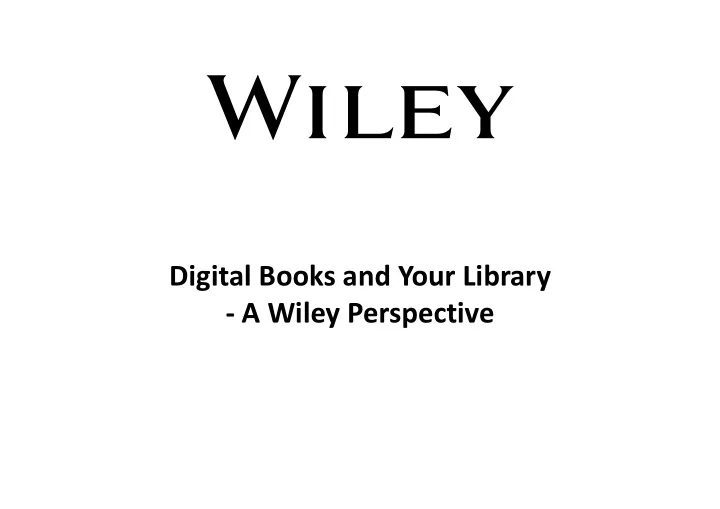

Digital Books and Your Library - A Wiley Perspective
A changing landscape • Last year in the UK more than 400 bookshops closed down, seven times more than in 2011. • There are now less than 2,000 bookshops left, less than half the number of seven years ago.
Print is declining • Physical book sales fell to £1.51bn in 2012, down from £1.59bn in 2011.
The rise of the e-book • In 2012 UK e-book sales doubled to £261m. • “One in four books sold will be e-books by 2014” James Daunt, managing director of Waterstones.
Devices • Mobile phones are set to overtake PCs as the most common Web access device worldwide by the end of 2013 • Over 80% of handsets sold in mature markets will be smartphones by 2105. smartphones by 2105. • Tablet shipments will reach around 50% of laptop shipments by 2015 .
Today’s students have grown up in the Internet age They have spent their entire lives surrounded by the toys and tools of the digital world
The Net Generation Today’s students think and process information fundamentally differently from their predecessors. They are active learners who are: • Always Connected • Always Connected • Multi-tasking • Resourceful • Inquisitive • Demand Customization • Independent and Interdependent
Libraries aren’t how we remember them Automated storage & retrieval system for print books Macquarie University Study Space
Library Budgets • Wiley recently undertook a global survey of 525 institutional libraries. • Institutes in North America, South America, Europe and Asia Pacific Region were contacted. • We spoke to Senior librarians with control over and knowledge of library budgets for 2013.
How do you see your digital book budget evolving in the next year? 52% are budgeting for more
How do you see your digital book budget evolving in the next three years? 63% will be budgeting for more
Where do you get your digital books? 14% do not purchase e-books 14% do not purchase e-books 18% go direct to publishers 68% use aggregators /elsewhere
Library Budgets We recognise budgets are under scrutiny and understand that libraries must: • adapt to new behaviours and technologies • adapt to new behaviours and technologies • demonstrate their institutional effectiveness • prove expenditure is in line with the value that they provide
How is Wiley responding? • Usage Based Collection Model • One-Time Fee Option • Subject Collections Option • Pay-Per-View and ArticleSelect tokens available for individual Chapters
Wiley Online Books MARC Records Unlimited concurrent users e-Alerts Perpetual access rights with one-time Flexible and Flexible and purchase portable access 24/7 No DRM restrictions Full text search COUNTER-compliant Copy/paste and print usage data functionality
Usage-Based Collection Management • Allows the library to present a much larger set of titles than would otherwise be possible. • An evidence based approach - libraries only buy • An evidence based approach - libraries only buy books where there is demand. • Freed from the constraints of large collections of which you will only make limited use.
Usage-Based Collection Management • Customer pays an up front fee for access to either the full Online Book Catalog or by Main Subject . • At the end of the access period, select titles based on • At the end of the access period, select titles based on usage with list price value equivalent to initial fee. • Titles selected are available with perpetual access rights, unlimited concurrent usage and no DRM restrictions.
Browse a book by Table of Contents Search, save chapter ONLINE BOOKS summaries Download at chapter level - PDF
Includes keywords, DOI, author details Access related articles in an instant Download Citations
Full chapters are supplied in familiar PDF format for convenient reading and printing convenient reading and printing
Other Options Pay-Per-View Title-by-Title Flexible subscription For individuals, per use Select your own titles. Ownership after three years Book Series 65 Subject Collections On Standing Order Build your e-library quickly and easily
Recommend
More recommend